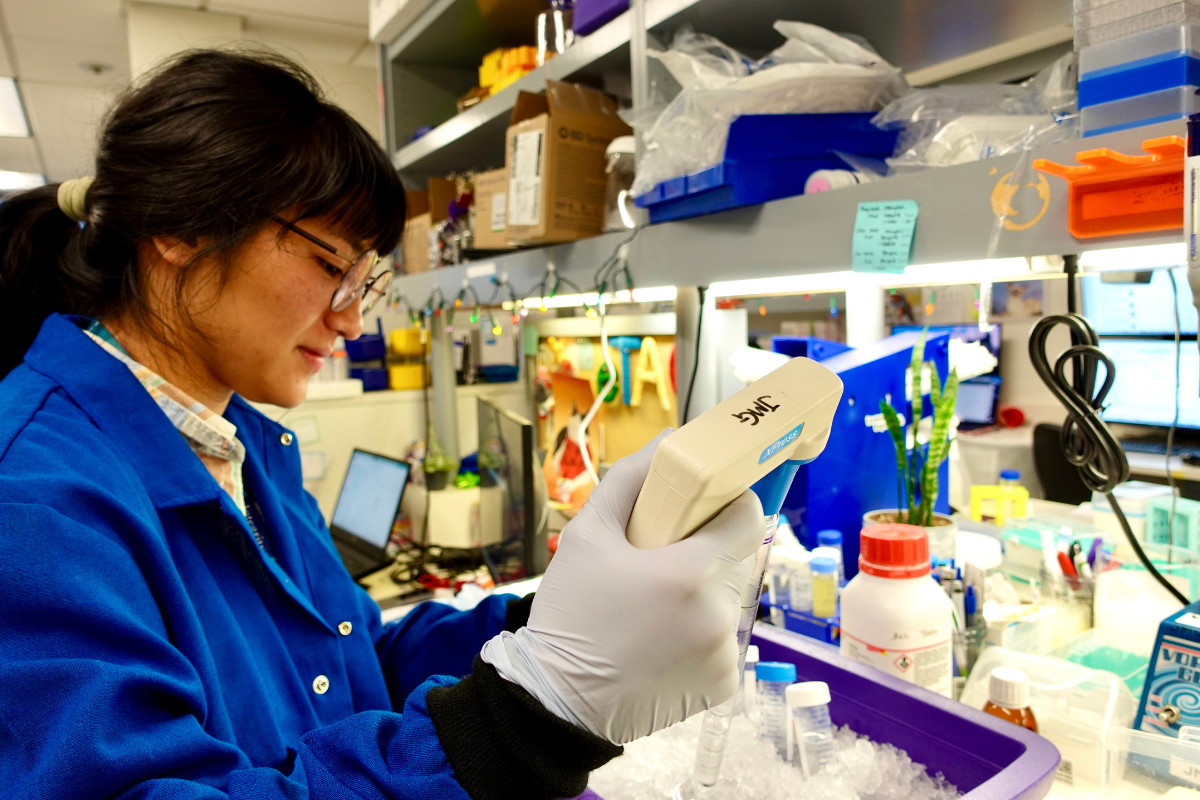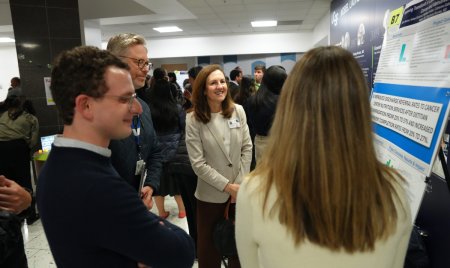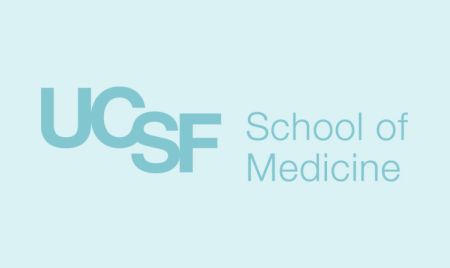Taking Time for Research: UCSF Medical Students Deepen Research Expertise During Gap Years

Known for its strong research focus, the UCSF School of Medicine encourages students to explore research opportunities throughout their medical education. Gap years, often taken between the third and fourth year, are a popular time for students to delve into research projects.
A significant portion of the Class of 2025 (24%) is currently taking a gap year, with 70% of these students pursuing research endeavors. Some students combine their gap year research with the MD/MAS in Clinical and Epidemiologic Research program, a five-year combined degree focused on advanced epidemiological and biostatistical methods.
Additional time or training in research often is not a prerequisite for being a competitive residency training applicant, especially since students in the Bridges Curriculum have research opportunities through Summer Explore between the first and second years of medical school and Deep Explore during Career Launch. However, some students appreciate opportunities to extend training for more in-depth, full-time experiences.
To support students in their research pursuits, the Inquiry Funding Office offers yearlong funding opportunities for full-time, mentored research projects. Students can apply for these grants through a unified application process. Some grant examples include: the School of Medicine Dean’s Yearlong Fellowship, UCSF Department of Surgery Yearlong Research Fellowship, UCSF Department of Anesthesia and Perioperative Care Yearlong Fellowship, UCSF Tom K. Hunt Memorial Fellowship, Anti-Oppression Curriculum Initiative Yearlong Fellowship, Kanbar Center Simulation Fellowship, and Kaiser Family Foundation Fellowship. Medical students selected to receive the Dean's Yearlong Fellowship can elect to take part in the Yearlong Inquiry Program (YIP), which provides additional coursework mentorship for their individualized research projects.

Jeannie Bailey, PhD, Associate Professor, Orthopedic Surgery, has been a research mentor since 2016. She studies novel ways to quantify pathological movement patterns in orthopedic patients using digital tools. She was drawn to mentorship because of her “love for learning how different people think about a problem and work together to figure out a solution.” She said, “all of the innovation in my work comes from talking to people with different outlooks on the same problem.” She shared that a gap year provides medical students, “training to truly learn how to do independent research.”
When asked for her advice for medical students considering research, Dr. Bailey said, “Academic medicine is important. Research is important. Sometimes research might seem like a mere necessity to have on your CV to get into residency; however, doing research in your specialty is a foundational way to shape your field and initiate bigger paradigm-changing conversations.”
We asked current gap year students, Aidan Foley, MS4, and Han Yin, MS4, to share their gap year and mentor experiences, research pursuits, future goals, and advice for students planning to pursue a gap year and research.
Aidan Foley, MS4, mentored by Dr. Jeannie Bailey, PhD and Dr. Brian Feeley, MD, Professor of Orthopedic Surgery, is currently in the first of his two planned gap years. He is an MD/MAS student and YIP scholar, with his research funded through the yearlong funding. Aidan’s research interest is focused on clinical outcomes, biomechanics, and motion captures related to different types of surgery. As an expansion of his Summer Explore Research project, Aidan currently aims to utilize his team’s new mobile app, ‘OrthoCap,’ to better understand how the recovery of biomechanical function relates to a patient’s readiness to return to sport and activity, which can be a challenge for many non-elite athlete patients.

What are your long-term career plans?
As I continue to learn a lot from my current experiences, I am considering a research track residency in Orthopedic Surgery. In the long term, I am considering a career as a researcher and clinician, including the use and development of digital health devices and broad integration of health care and technology.
How does research influence your desired medical specialty and vice versa?
Prior to medical school, I never considered research as a career path, but my experience with my mentors and my research projects has helped me consider a path as a surgeon-scientist. I want to pursue a career in Orthopedic Surgery and that brought me to my research. I want to continue this avenue of research, as it continues to be interesting. Specifically, it has encouraged me to think broadly about Orthopedic Surgery, and to consider and think deeply about clinical outcomes, patient recovery, pre- and post-surgical functions, and biomechanics—how patients move before and after surgery.
What is one thing you’ll take away from your experience working with your mentor?
There are many reasons why my mentors are great: the support system and responsibilities I’ve been given are great learning experiences and opportunities. Dr. Feeley’s clinical expertise and research knowledge has allowed me to think deeply and practically about clinical questions as we meet in the clinic weekly and talk to patients. Dr. Bailey’s translational, basic, and data science knowledge has allowed me to get mentorship and support in figuring how to put everything together in a robust and cohesive story, how to do the science behind the clinical question, and how to do it in fun and innovative ways!
What is your advice for medical students considering gap year and research?
Put in the effort up front when finding a mentor and research project because having a mentor who supports you and also allows you to take ownership on projects can influence how your projects come to fruition and how much you learn beyond the classic products of research. Consider your strengths and weaknesses as a mentee and work on a project that is interesting to you. I acknowledge that people have different timelines and goals for what they want from research. Prioritize quality over quantity. My own philosophy is that I want to learn as much as I can on conducting sound and interesting research, interpret papers, and be independent if I were to start this as a career path.

Han Yin, MS4, mentored by Dr. James Gardner, MD PhD, is now in her second gap year. She is currently funded through the yearlong funding and was funded through mentor funding during her first year. As part of the Gardner lab, she studies the mechanisms of immune tolerance. She focuses on cells outside the thymus that express the AIRE protein and may have complementary roles in maintaining immune tolerance, including in cancer cells, where she uses mouse models for hepatocellular carcinoma.
What are your long-term career plans?
I am interested in pursuing General Surgery for residency. I want to target seven-year residency programs, so I can do more research. I want research to be part of my long-term goal, but I also recognize how competitive that path can be.
How does research influence your desired medical specialty and vice versa?
When I started medical school, I was not certain I wanted to pursue surgery, but I knew I wanted to get more research experience. As I learned more about surgery, met different kinds of surgeons, and gained a better understanding of the field, I became more focused on a career in Cancer Immunology and Oncology.
What is one thing you’ll take away from your experience working with your mentor?
My mentor is invested in my career goals and gives me the freedom and flexibility to pursue the things I am interested in. Based on my goals, having a mentor who is able to provide perspectives in both basic and clinical science is valuable. My takeaway from this experience is that it is possible to be proficient in both basic science and surgery.
What is your advice for medical students considering gap year and research?
I think a gap year is a good option. It is a great thing to do and has benefitted me, but I recognize that students can face pressure to take or not take a gap year. My advice is to not care about what others are doing and focus on whether a gap year makes sense for you. How will it benefit your career? Does it suit your work-life balance? And does it make sense with where you are in your life right now?
Are you a UCSF medical student considering a gap year?
UCSF medical students considering a gap year can get support from the Student Experience Team (SET) led by Dr. Erick Hung, MD. Additional information is covered during Physician Identity (PI) Week 6 and can be discussed with Career Launch Advisor, Wenia Lee.









